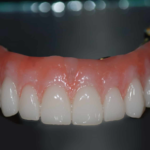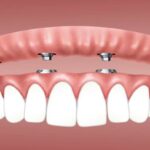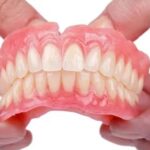After getting partial dentures, you will notice improved chewing and appearance. This dental appliance can help restore your smile and restore function, making eating and speaking easier.
Partial dentures are custom-made to fit your mouth and can be used to replace one or more missing teeth. They are designed to blend in with your natural teeth and provide a comfortable and secure fit. By addressing gaps and supporting neighboring teeth, partial dentures can also help prevent further oral health issues.
With proper care and maintenance, partial dentures can last for many years, providing confidence and comfort for those with missing teeth. If you need a simple and effective solution to restore your smile and oral function, partial dentures may be the right choice for you.
What Are Partial Dentures?
Partial dentures are removable dental appliances used to replace missing teeth. They are made up of artificial teeth attached to a metal or plastic framework that comfortably fits into the mouth. These dentures are designed to blend in with your natural teeth, restoring your smile and preventing further dental problems.
Overview
Partial dentures serve as an affordable and non-invasive solution for individuals missing one or more teeth. These dentures are custom-made to ensure a comfortable and secure fit. They can restore your ability to chew and speak properly while enhancing your overall oral health.
Types Of Partial Dentures
There are two main types of partial dentures:
| 1. Removable Partial Dentures | 2. Fixed Partial Dentures |
| Removable partial dentures are designed to be easily taken out and cleaned. They are held in place by clasps that attach to your existing teeth. | Fixed partial dentures, also known as dental bridges, are permanently affixed to your natural teeth using dental crowns or implants. |
Each type of partial denture has its own advantages and considerations. It is important to consult with your dentist to determine the best option for your specific dental needs.
Before Getting Partial Dentures
Before getting partial dentures, it is important to schedule a consultation with a qualified dentist. During this initial meeting, the dentist will assess your oral health and discuss the best treatment options. Following the consultation, the dentist will begin the preparation process for the partial dentures. This may involve taking impressions and measurements of your mouth to ensure a custom fit for the dentures. The precision of these steps is crucial for the optimal functionality and comfort of the partial dentures.
Wearing Partial Dentures
Wearing partial dentures can be an adjustment for many people. During the adjustment period, it’s normal to experience some discomfort, but this typically subsides once your mouth gets used to the dentures. Daily care is important to maintain the longevity of your partial dentures. Always remove them at night and clean them thoroughly. When it comes to eating and speaking, you may need to make some adjustments. Avoid hard or sticky foods and practice speaking aloud to improve your pronunciation. Moreover, regular dental check-ups are crucial to ensure the proper fit and function of your partial dentures.
Benefits Of Partial Dentures
Partial dentures offer several benefits, including an improved appearance by replacing missing teeth and restoring facial contours. These dentures allow individuals to regain their natural smile, giving them a more youthful and confident appearance. In addition to aesthetics, partial dentures also restore dental function by improving chewing and speaking ability. They help distribute the forces of your bite more evenly, preventing further damage to the remaining natural teeth. This dental solution also promotes oral health by preventing the adjacent teeth from shifting into the gaps left by missing teeth. Furthermore, partial dentures contribute to a boost in self-esteem and confidence. With a renewed smile, individuals can enjoy social situations without feeling self-conscious or insecure.
With improved appearance, restored dental function, and a boost in confidence, the benefits of partial dentures are undeniable. They provide an effective solution for individuals who have lost some of their natural teeth, enabling them to lead a more comfortable and fulfilling life.
After Getting Partial Dentures
Follow-up appointments are an essential part of the denture process. During these appointments, your dentist will assess the fit and comfort of your dentures and make any necessary adjustments. These visits are crucial to ensuring your dentures feel natural and function properly.
To maintain your partial dentures and keep them in good condition, it’s important to follow a few maintenance tips. Always remove and rinse your dentures after eating to remove any food particles. Brush your dentures gently with a soft-bristle toothbrush and non-abrasive denture cleaner to remove any stains or plaque buildup. Remember to brush your natural teeth and gums as well to maintain overall oral health.
While partial dentures offer numerous benefits, they can present certain challenges. Initially, you may experience some difficulty speaking and eating as your mouth adjusts to the dentures. This is temporary and will improve with time and practice. Another challenge is the potential for dentures to become loose or uncomfortable. If this occurs, it’s important to schedule a follow-up appointment with your dentist for adjustments.
| Potential Challenges | Solutions |
| Eating and speaking difficulties | Practice and time for adjustment |
| Loose or uncomfortable dentures | Schedule a follow-up appointment for adjustments |
By following these guidelines and regularly attending follow-up appointments, you can ensure a successful experience with partial dentures. Remember, maintaining good oral hygiene and seeking professional dental care are key to keeping your smile healthy and functional.
Frequently Asked Questions For Before And After Partial Dentures
Can I Eat Normally With Partial Dentures?
Yes, you can eat normally with partial dentures. However, it is recommended to start with soft foods initially and gradually transition to harder foods. Avoid sticky and hard foods that may damage or dislodge the dentures. Proper cleaning of the dentures and maintaining good oral hygiene is also important.
How Long Does It Take To Get Used To Wearing Partial Dentures?
It usually takes a few weeks to get used to wearing partial dentures. Initially, you may experience some discomfort, soreness, or difficulty speaking and eating. With time, as your mouth muscles adjust and the dentures settle in, these issues should improve.
It’s advised to follow your dentist’s instructions and attend follow-up appointments for adjustments if needed.
How Do I Clean And Care For My Partial Dentures?
To clean and care for your partial dentures, remove them after eating and rinse them thoroughly. Brush your dentures with a soft-bristled brush and denture cleaner or mild soap. Avoid using toothpaste as it can be abrasive. Soak the dentures overnight in a denture cleaning solution.
Handle them with care, avoid dropping them, and schedule regular dental check-ups to ensure proper maintenance.
Conclusion
Partial dentures can be a transformative solution for patients who have missing teeth, providing both functional and aesthetic benefits. By filling the gaps in their smile, individuals can regain their self-confidence and enjoy an improved quality of life. With advancements in dental technology, modern partial dentures offer a natural appearance and enhanced comfort.
If you are considering partial dentures, consult with your dentist to understand the best options for your specific needs and experience the positive difference they can make.














